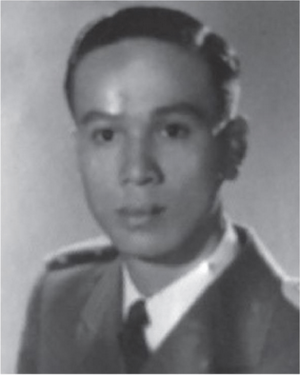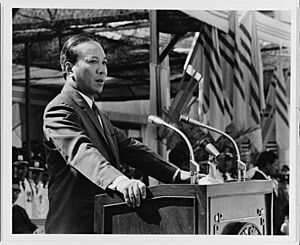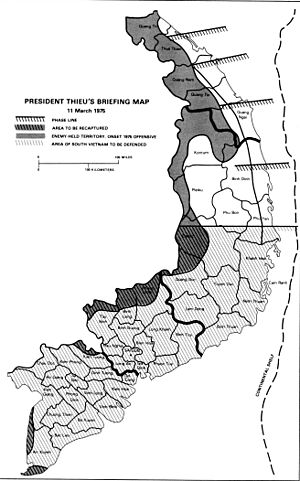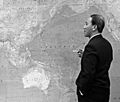Nguyễn Văn Thiệu facts for kids
Quick facts for kids
Nguyễn Văn Thiệu
|
|
|---|---|
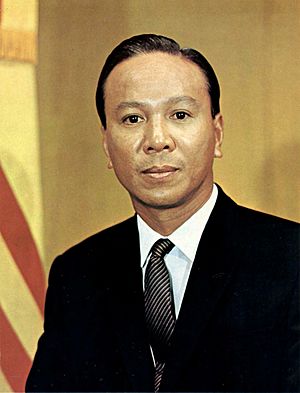
Official portrait, 1969
|
|
| 2nd President of the Republic of Vietnam | |
| In office 31 October 1967 – 21 April 1975 |
|
| Prime Minister |
|
| Vice President |
|
| Preceded by | Himself (as Chairman of the National Leadership Committee) |
| Succeeded by | Trần Văn Hương |
| Chairman of the National Leadership Committee | |
| In office 19 June 1965 – 31 October 1967 |
|
| Prime Minister | Nguyễn Cao Kỳ |
| Preceded by | Phan Khắc Sửu |
| Succeeded by | Position abolished |
| Minister of National Defense of the Republic of Vietnam | |
| In office 16 February 1965 – 19 June 1965 |
|
| Prime Minister | Phan Huy Quát |
| Preceded by | Trần Văn Minh |
| Succeeded by | Nguyễn Hữu Có |
| Deputy Prime Minister of the Republic of Vietnam | |
| In office 18 January 1965 – 12 June 1965 Serving with Nguyễn Lưu Viên
Nguyễn Xuân Oánh Trần Văn Đỗ Trần Văn Tuyên |
|
| Prime Minister | Trần Văn Hương Nguyễn Xuân Oánh Acting Phan Huy Quát |
| Personal details | |
| Born | 5 April 1923 Phan Rang–Tháp Chàm, Ninh Thuận province, French Indochina |
| Died | 29 September 2001 (aged 78) Boston, Massachusetts, U.S. |
| Political party | National Social Democratic Front |
| Other political affiliations |
Cần Lao (until 1963) Communist Party of Vietnam (1945-1946) |
| Spouse |
Nguyễn Thị Mai Anh
(m. 1951) |
| Children | 3 |
| Profession | Army officer and politician |
| Signature |  |
| Military service | |
| Allegiance | |
| Branch/service |
|
| Years of service | 1943–1967 |
| Rank | Lieutenant general (Trung Tướng) |
| Commands |
|
| Battles/wars |
|
Nguyễn Văn Thiệu (born April 5, 1923 – died September 29, 2001) was a military officer and politician from South Vietnam. He served as the president of South Vietnam from 1967 to 1975. Thiệu was a general in the Republic of Vietnam Armed Forces (RVNAF). He became the leader of a military government in 1965. Then, he won an election in 1967 to become president. He led South Vietnam until he resigned and left the country in April 1975. This was just before the fall of Saigon and the end of the Vietnam War, when North Vietnam won.
Thiệu was born in Phan Rang, a city on the south central coast of Vietnam. He joined the Việt Minh in 1945, a group led by Hồ Chí Minh that wanted Vietnam to be independent. But he left after a year. He then joined the Vietnamese National Army (VNA), which was supported by France. He rose through the military ranks. In 1954, he led a group of soldiers to remove communists from his hometown. After France left Vietnam, the VNA became the ARVN (Army of the Republic of Vietnam). Thiệu was the head of the Vietnamese National Military Academy for four years. He then became a division commander.
In November 1960, Thiệu helped stop a coup attempt against President Ngô Đình Diệm. During this time, he became a Roman Catholic. He also joined the government's secret Cần Lao Party. Some people believed that President Diệm favored Catholics. Thiệu was accused of changing his religion to get ahead in his career.
Despite this, Thiệu joined the coup against Ngô Đình Diệm in November 1963. He led the attack on Gia Long Palace. Diệm was captured and killed, and Thiệu was made a general. After Diệm's death, there were many quick changes in leadership. Thiệu slowly gained power by being careful. Other officers fought among themselves. In 1965, Thiệu became the leader of South Vietnam, while Air Marshal Nguyễn Cao Kỳ became prime minister. They were rivals.
In 1967, South Vietnam was supposed to switch to an elected government. Thiệu ran for president with Kỳ as his running mate. Both men wanted to be president. Their fellow officers agreed that a military group led by Kỳ would make important decisions behind the scenes. But Thiệu became stronger and removed Kỳ's supporters from important military and government jobs.
Thiệu then passed laws to make it hard for others to run in the 1971 election. He blocked almost all his opponents. The others quit because it was clear the election would not be fair. Thiệu won more than 90 percent of the votes without anyone running against him. Kỳ then left politics.
During his time as president, Thiệu was accused of allowing corruption. He also appointed loyal friends instead of skilled officers to lead army units. During the 1971 Operation Lam Sơn 719 and the communists' Easter Offensive, a key army unit in the north was led by his friend, Hoàng Xuân Lãm. This officer's poor leadership led to big defeats. Thiệu eventually replaced him with Ngô Quang Trưởng.
After the Paris Peace Accords were signed in 1973, US troops left Vietnam. Thiệu had been against this peace deal. South Vietnam fought the communists for two more years. Then, the communists launched their final push for victory. The North Vietnamese army openly invaded the South. Thiệu gave confusing orders to his generals. This caused panic and collapse in the south. The communists gained a lot of power. Within a month, they were close to Saigon. This led Thiệu to resign and leave the country. He later settled near Boston, Massachusetts, and did not often speak to the media. He died in 2001.
Some people have described Thiệu as a dictator, similar to Ngô Đình Diệm.
Contents
Early Life and Military Career
Thiệu was born in Phan Rang, on the south central coast of Vietnam. He was the youngest of five children. His family was well-off, owning land and earning money from farming and fishing. His older brothers helped pay for him to attend special schools run by France. France was the colonial ruler of Vietnam at the time. Thiệu went to Pellerin, a French-run Catholic school in Huế. He was not Catholic at the time but converted later.
During World War II, Imperial Japan took control of French Indochina. Thiệu continued to work with his father for three more years.
Joining the Việt Minh and French-backed Army
After World War II ended, Thiệu joined the Việt Minh. This group, led by Hồ Chí Minh, wanted Vietnam to be free from France. Thiệu trained with bamboo sticks because they had no rifles. He became a district chief. But he left the Việt Minh after only one year, in 1946. This was when the French returned to southern Vietnam to fight the Việt Minh. Thiệu said he realized the Việt Minh were communists. He said they "shot people" and "seized the land." He then went to Saigon and joined the forces of the French-backed State of Vietnam.
With help from his brother, Thiệu first joined the Merchant Marine Academy. After a year, he became an officer. But he refused a job on a ship when he found out the French owners would pay him less than French colleagues. This event made him wary of foreigners. Later, as a leader, Thiệu was known for being suspicious of his American allies.
Thiệu then moved to the National Military Academy in Đà Lạt. In 1949, he became a 2nd Lieutenant in the Vietnam National Army. This army was created by former Emperor Bảo Đại to fight the Việt Minh. Thiệu started as a platoon commander fighting the Việt Minh. He quickly moved up in rank. He was known as a careful strategist. He avoided attacking unless he was almost sure to win. He also trained in France and at the Staff College in Hanoi. By 1954, he was a major. He led a group that forced the Việt Minh out of his hometown, Phan Rang.
Leading the Army of the Republic of Vietnam
Thiệu was a lieutenant colonel when the Republic of Vietnam (South Vietnam) became fully independent in 1955. This happened after French forces left, following the 1954 Geneva Agreement. In 1956, he became the head of the National Military Academy in Đà Lạt. He held this job for four years. There, he made connections with many younger officers. These officers later became his generals and colonels when he became president.
Thiệu also went to the United States for military training in 1957 and 1960. He studied at the Command and General Staff College in Fort Leavenworth, Kansas. He also trained in weapons at Fort Bliss, Texas.
Rise to Power
Stopping a Coup Attempt
On November 11, 1960, some colonels tried to overthrow President Ngô Đình Diệm. They surrounded the palace but stopped fighting to negotiate. Diệm falsely promised changes to gain time. Thiệu sent his 7th Division from Biên Hòa to help Diệm. After a short, violent battle, the coup failed. Thiệu was then put in charge of the 1st Division in Huế. Later, he commanded the 5th Division in Biên Hòa.
Joining the Coup Against Diệm
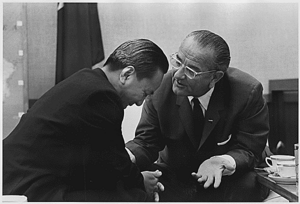
Thiệu eventually turned against President Diệm. On November 1, 1963, he led his 5th Division in the revolt. His troops attacked Gia Long Palace. The palace fell, and Diệm was captured and killed. Thiệu was then made a general by the new military government.
After Diệm's death, South Vietnam had many quick changes in leadership. Thiệu became a member of the 12-man Military Revolutionary Council. He was the secretary general. He slowly gained more power as other generals were removed or exiled.
Becoming Chief of State
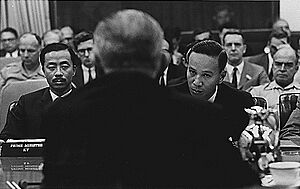
In mid-1965, Thiệu became the official head of state of a military government. Nguyễn Cao Kỳ became the prime minister. Their leadership brought some stability after many changes since Diệm's death. They imposed strict rules, like censorship, and closed newspapers. They also tried to get more people to join the military.
In 1966, Kỳ removed General Thi, which caused protests. Thiệu and Kỳ's forces put down these protests. This ended major opposition to their rule.
President of South Vietnam
1967 Presidential Election
The United States wanted South Vietnam to have a constitutional government. So, elections for president and legislature were planned for 1967. On September 3, 1967, Thiệu successfully ran for president with Kỳ as his running mate. Thiệu won with 34% of the votes. He promised democracy and social changes. He said he would "open wide the door of peace."
This election started a power struggle between Thiệu and Kỳ. The military had agreed to support one candidate. Kỳ only agreed to be Thiệu's running mate after being promised real power behind the scenes. But Thiệu wanted to control everything himself.
Tet Offensive and Its Aftermath
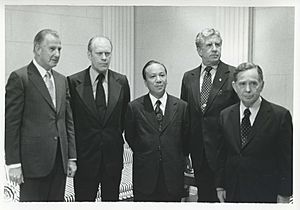
In early 1968, during the Lunar New Year, the communists launched a huge attack on Vietnamese cities. They wanted to overthrow Thiệu. Thiệu was out of town during the attack on Saigon. Kỳ took charge and organized the military. The South Vietnamese army and Americans fought back the communists.
Even though the communists were pushed back, South Vietnam suffered a lot. The fighting reached the cities for the first time. This damaged public trust in Thiệu. He seemed unable to protect the citizens. Many homes were destroyed, and many people became refugees.
After the offensive, Thiệu's government became more active. He declared martial law. He also ordered a general call-up for military service. This increased South Vietnam's military to over 900,000 men. Thiệu also used this time to gain more personal power. He removed Kỳ's supporters from the military and government. He also cracked down on the press. People started calling him "the little dictator." Kỳ slowly lost all his influence.
Re-election and Challenges
In 1971, Thiệu ran for re-election. But his reputation for corruption made his opponents believe the election would be rigged. So, they decided not to run. As the only candidate, Thiệu was easily re-elected on October 2. He received 94% of the votes. Many believed these numbers were fake.
The Paris Peace Accords were signed in January 1973. This agreement was supposed to end the fighting. But North Vietnam immediately broke the ceasefire. They tried to gain more land, leading to big battles. Thiệu was against the peace deal. He publicly stated "Four Nos": no talks with communists, no communist activities in the South, no shared government, and no giving up land. Thiệu believed the US would send air power if the communists broke the agreement. He also thought US aid would continue.
However, in 1973, the US Congress passed laws that stopped US combat in Vietnam. US funding for South Vietnam was cut by more than half. Thiệu and his government still hoped for US aid.
In 1974, Thiệu decided to attack. He spread his forces thin to take back land captured by North Vietnam. These attacks were successful, but they cost many soldiers and resources. By the end of the year, the South Vietnamese military had equipment shortages. This was because American aid had decreased. Meanwhile, communist forces grew stronger.
Morale in the South Vietnamese army dropped. Many soldiers left. Only 65% of registered soldiers were present. Morale also fell because Thiệu kept promoting officers based on loyalty, not skill. Corruption was common. The aid cuts meant that artillery could only fire a few rounds a day. Each soldier had only 85 bullets per month. Air force operations shrank by 70% due to lack of fuel and parts.
The Final Collapse
By late 1974, about 370,000 communist troops were in South Vietnam. They had more and more military equipment. In mid-December, the communists attacked Phước Long. They quickly took control of the city.
On January 6, 1975, Phước Long City became the first provincial capital permanently captured by the communists. Thiệu decided to give up the province. He thought it was less important than other areas. The communists then decided to launch a full attack on the central highlands.
The battle for Buôn Ma Thuột began on March 10. It ended eight days later. South Vietnamese reinforcements were sent but were defeated. On March 18, the communists took full control of Đắk Lắk Province. Thiệu sent a group to Washington to ask for more aid. US Ambassador Graham Martin also went to Washington. But the US Congress refused to give more military funding.
During this time, Thiệu felt more pressure. He became very suspicious. He thought people were plotting against him. His decisions became isolated, without much advice from others. His officers followed his military decisions, believing he "made all the decisions."
Abandoning the Central Highlands
By March 11, Thiệu realized the US would not send more aid. He decided to change his strategy. He would only defend the most important and populated areas. He drew lines on a map, showing that forces in the north could move south if needed. Thiệu called this "Light at the top, heavy on the bottom."
Thiệu decided to give up Pleiku and Kon Tum. He wanted the II Corps forces to focus on taking back Buôn Ma Thuột. The commander of II Corps decided to retreat to the coast. This retreat of hundreds of thousands of soldiers and civilians was very dangerous. It was poorly planned, and many officers were not told. The communist forces caught up and attacked the convoy.
Many people died. By the time the convoy reached Tuy Hòa on March 27, only a small number of soldiers and civilians had survived. Thiệu's order to evacuate, which came too late, caused chaos and a bloodbath. The plan to retake Buôn Ma Thuột never happened. The North Vietnamese then took over the whole region easily.
Thiệu's Final Days as President
A worse collapse happened in the northernmost I Corps. This was after Thiệu gave confusing orders. The commander, Ngô Quang Trưởng, was considered the nation's best general. Thiệu told Trưởng he could move his forces south to defend Đà Nẵng, the second largest city. Thiệu also decided to remove two elite divisions from Trưởng's command.
Thiệu then told Trưởng that he had misunderstood. Huế, the old imperial capital, was not to be abandoned. Meanwhile, civilians started to flee, blocking the roads. Trưởng asked to retreat to a new defense line to protect Huế. Thiệu then ordered him to defend only Đà Nẵng.
The people of Quảng Trị and Huế began to leave their homes by the hundreds of thousands. They joined a growing crowd heading for Đà Nẵng. The North Vietnamese closed in on Đà Nẵng. The South Vietnamese tried to evacuate by sea, but Thiệu refused to make a decision. Trưởng ordered a naval withdrawal anyway.
The evacuation became a disaster. The communists attacked the city with artillery, killing many. Thousands drowned trying to get on boats. Only a small number of soldiers and civilians were evacuated. Many troops were captured. Half the country fell in two weeks. When his hometown of Phan Rang fell, retreating South Vietnamese troops showed their anger by destroying his family's shrines.
By this time, the North Vietnamese decided to win the war within two months. On April 7, 1975, they prepared a three-part attack. The goal was to take Xuân Lộc, the "gateway to Saigon." The fighting at Xuân Lộc was the most important battle of the offensive. The South Vietnamese fought bravely but were outnumbered. The communists then surrounded Saigon.
On April 10, US President Gerald Ford asked Congress for more military aid for South Vietnam. But Congress refused. On April 21, 1975, Thiệu resigned as president. He had lost the trust of his allies. In his farewell speech, he admitted ordering the evacuation of the Central Highlands. He blamed the generals.
Thiệu also strongly criticized the US. He said, "The United States has not respected its promises." He added, "The United States did not keep its word." He complained about US funding cuts, saying, "You don't fight by miracles, you need high morale and bravery." He also blamed the media for reporting on his government's corruption.
After his speech, Vice President Trần Văn Hương became president. But the communist advance could not be stopped. They took Saigon on April 30, 1975, ending the war.
Life After the Presidency
Thiệu said, "I resign, but I do not desert." However, he fled to Taiwan five days later. He later settled in London. In the early 1990s, Thiệu moved to Foxborough, Massachusetts, in the US. He lived a quiet life. He rarely gave interviews or wrote about his experiences. Neighbors knew little about him.
Thiệu believed that the Vietnamese Communist Party would eventually lose power. He warned the United States government not to establish diplomatic relations with the communist government. But relations between the US and Vietnam were formally established in 1995. Thiệu said he would return to Vietnam if democracy was restored. But this did not happen during his lifetime.
Some people criticized Thiệu, but others appreciated him. US Ambassador Ellsworth Bunker said Thiệu was "an individual of very considerable intellectual capacity." He also said Thiệu acted "more and more like a politician." Military historian Lewis Sorley suggested Thiệu "was arguably a more honest and decent man than Lyndon Johnson."
Death
Thiệu and his wife celebrated their 50th wedding anniversary in Hawaii. This was when the September 11 attacks happened in 2001. The attacks affected Thiệu's health. He died on September 29, 2001, at age 78, in Boston. He had collapsed and was put on a breathing machine after a stroke. His funeral was held on October 6, 2001. He was cremated. His wife said he wanted to be buried in his hometown of Phan Rang. If not, his ashes would be scattered half in the sea and half on the mountain.
Personal Life
In 1951, Thiệu married Nguyễn Thị Mai Anh. She was the daughter of a rich herbal medicine doctor. She was a Roman Catholic. Thiệu converted to Catholicism in 1958. Some critics said he did this to get promoted in the military. This was because President Diệm was known to favor Catholics. The couple had two sons and one daughter. Thiệu spoke Vietnamese, English, and French fluently.
Awards and Decorations
 South Vietnam:
South Vietnam:
 National Order of Vietnam (Grand Cross)
National Order of Vietnam (Grand Cross) National Order of Vietnam (Commander)
National Order of Vietnam (Commander) Army Distinguished Service Order (1st class)
Army Distinguished Service Order (1st class) Air Force Distinguished Service Order (1st class)
Air Force Distinguished Service Order (1st class) Navy Distinguished Service Order (1st class)
Navy Distinguished Service Order (1st class) Military Merit Medal
Military Merit Medal Good Conduct Medal (2nd class)
Good Conduct Medal (2nd class) Military Service Medal (2nd class)
Military Service Medal (2nd class) Armed Forces Honor Medal (1st class)
Armed Forces Honor Medal (1st class) Vietnamese Gallantry Cross with 3 palms
Vietnamese Gallantry Cross with 3 palms Army Meritorious Service Medal
Army Meritorious Service Medal Vietnam Campaign Medal
Vietnam Campaign Medal
 France:
France:
 South Korea:
South Korea:
 United States:
United States:
Images for kids
See also
 In Spanish: Nguyên Van Thieu para niños
In Spanish: Nguyên Van Thieu para niños
 | George Robert Carruthers |
 | Patricia Bath |
 | Jan Ernst Matzeliger |
 | Alexander Miles |


